Text
Don’t cross the themes!
The following note contains heavy spoilers about the plot of both 1984 & 2016 Ghostbusters movies, and a tiny one - a line of dialogue - from Ocean’s 8.
“Having only girls in the new Ghostbusters movie makes no sense and is as sexist as having only males, you -”
Ok so, this is where I’m gonna cut that quote from about 78 random dudes sharing their opinion on Paul Feig’s Ghostbusters with me (so much love I did not ask for <3), because this is usually where said opinion goes from PG to NC-17.
I said in a previous note that arguing with people about movies was one of the greatest things in life... provided that people’s opinions were at least a tad respectful, and a tad built on something, ANYTHING, beyond basic casual hatred for women (oh hello, guys who want to remake The Last Jedi!).
That being said, I’m going to be the bigger person here and still take time to answer those 78 gentlemen with a little piece on why, in my humble opinion, having women in the Ghostbusters reboot not only makes sense, but makes it a more functioning movie when it comes to characters and even themes. Ok, let’s do this.

First things first: while I’m interested in comparison, I don't think it's relevant to try and rank the 2 movies: I personally enjoy the 2016 more, but I can acknowledge its weaknesses. It’s just than what works in it is way more compelling to me as a viewer (and, yes, as a female viewer). On the other hand, I’ll admit the qualities of the original, mostly to be an effortless piece of good writing, but it’s weaker where the 2016 shines, and vice-versa. Ultimately, those are 2 different movies, actually telling two different stories.
Yes, I know, both are about a team of semi-misfits chasing ghosts. But one story focus (1984) is around a philosophical idea, and the second is about human/women condition (2016). One is built around a (fun, entertaining and functioning) concept, i.e. busting ghosts, the other is about characters paths.
To the point where I think there’s close to no character arc in the original Ghostbusters. I mean think about it: how did the characters changed between beginning and end? When the film starts, they already know each other’s, have a functioning relationship and it turns out all along that they were pretty much right on everything from the start. They’re not exactly challenged on their beliefs, way to see the world, behaviours or just plain personalities, not even Bill Murray’s Peter Venkman, when this character is actually both a jerk and a fraud. Sure, Sigourney Weaver’s Dana calls him a fraud at some point, but this is a Tchekov gun being flashed without being shot, since from there, Dana is possessed by Zuul and kind of written off the movie (which is a shame).
Now, I won’t make this piece a full digression on why Peter Venkman is a jerk and how this fact could make us file the movie itself under “lovable but still a bit problematic”, yet this still deserves a couple lines because when you look closely: Peter Venkman is a jerk, borderline creepy (and the movie never gives us fuel to think otherwise, for real). Actually, Peter Venkman is pretty much what the bad guy of Ghostbusters 2016 (Rowan) could have become if he had any kind of power. We see Peter act just the way Rowan would if he had the upper hand on someone: he cheats on his own experiment, abuses a student as a faculty, make creepy innuendos to women who did not ask for this... I make this point because as the 2016 bad guy, Rowan makes perfect sense. Meanwhile, there’s no actual human big bad in the 1984 version, because there’s no specific reason for the events to happen when they happen.
Exactly, why is New York infected by ghosts in the original Ghostbusters? Ok, I wasn’t alive back in 1984 and maybe there's something I miss, a reference to a historical “mood” if you’ll have it, maybe an “end of the world vibe” I don’t not know about. But between some obvious referencing to Exorcist and the general comedic tone of the film, I’ve always watched Ghostbusters as some kind of parody or reappropriation of a genre, and not a reflection of its time.
And it’s okay. All of the above (well, maybe not Venkman never being called on his jerkiness): the lack of proper character arcs, human villain or symbolic reason for the infestation to happen. First, because, thanks to great dialogues & great acting by already beloved actors, we still care for those guys. But more important: because you can have great stories without it. Stories propulsed by something else than character development, such as... a theme. And 1984 Ghostbusters statement is a pretty damn interesting one: science beats superstition, well, science can explain supernatural, science beats ghosts, science beats freakin’ Gods, so man can beat god. Seriously, This is a great theme, and the script is nicely built around it, up to an ending where we see nerds vanquish a god with scientific tech. 1984 Ghosbusters makes writing choices and works, and as a movie about defeating incarnations of both childhood and adulthood fears (monsters and gods) it turns out to be a smart and timeless piece of pop culture.
Now you can argue that if it’s timeless, did it really needed to be rebooted in the first place? But see, the beauty of this reboot is that it does not try to redo the same thing. Because the 2016 Ghostbusters makes completely different writing choices, revolves around something else entirely, and if its theme also features some universal / timeless aspects, its treatment makes it a very relevant piece to the time it came out. So let’s break it down:
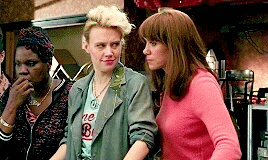
First, I believe its writing to be deeply entwined with characters’ flaws and development. What they want, what they lack, is the main propulsion for the story. And if we agree to say Kristen Wiig’s Erin Gilbert is our main character here, what she wants is consideration by her pairs. You can argue she has that at the beginning: teacher in a decent university, about to get tenure, but remember that to get this far, she had to leave behind her best friend and what she actually believed in. She had to fit. Meanwhile Abby is still working on what she wants but in a D-list school and only because the dean has no idea who she is. Both have to hide what matters to them to be included. And this theme as well as Erin’s relationship with Abby is one of the pivot point of the movie: the past and the complicated present of the characters weigh into the script, introduce conflict, propulsion and ultimately, resolution.
But this quest for being legit really works for the 4 of our characters: Abby & Jillian get their a** fired as soon as the dean actually remembers what they’re working on. Patty too: while she works un ungrateful job below the surface, she actually knows the city above ground better than any other character, not only places and localisation but historical perspective, arts...
(It’s also interesting to note, if we want to compare the 2 movies that in 1984, Dana sees a ghost and become a client of the Ghostbusters (then a victim of said ghost). In 2016, the woman who sees a ghost, i.e. Patty, joins the team as a Ghostbuster herself. Women are no more plot devices here: they have they own agendas & needs, they’re the engine of the story.)
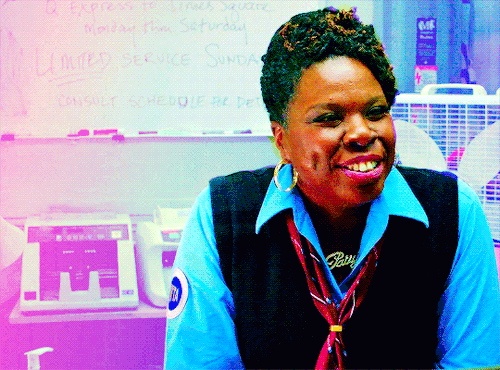
So you have this characters trying to be acknowledged as professionals, which works perfectly with the concept “scientists turning into ghosts hunters”. But what’s even better: it works perfectly with an all-female group of characters. Why? Well, because in real life, you can totally be denied the legitimacy you deserve just. for. being. a. woman.
It’s also completely in resonance with a movie about sorority and the way girls have to stick out for each other (Abby & Erin reconciliation). Sexism could actually be seen as the villain here. It’s a picture paint with small brushes (and that’s something to add to the film credit) but it’s there: the little jokes about online comments - an obvious yes short nod to the guys who managed to troll the movie notation before it even came out (isn’t it grand though? I mean those douchebags are so freaking predictable Paul Feig managed to write them in before they even manifest themselves) - the dean behaviour... Apart from that, 2016 Ghostbusters does not state out loud the fact those women are depreciated for being women, for it doesn’t need to. Because you know what? Women knows. And it's their freaking film.
Of course the clearest illustration of that idea has to be the bad guy. Rowan is indeed a misogynist jerk, but beyond that, is the perfect incarnation of those women antagonist in 2016. So in 1984 Ghostbusters, we don’t know exactly why the wall between the worlds is getting thinner right now: the guy behind it is a god and well, gods work in mysterious ways. But in 2016, the grand master is a human. Because that version is not about god vs men, it’s about men vs men. Because not all men / humans are equal.
It makes perfect sense her to have the ghosts being summoned by a villain who happens to be a persona of entitled jerks feeling they’re not recognized for their true value (hey! theme again!). Except Rowan / those guys are not denied respect on an essentialist aspect of themselves (being a woman, black, gay...) but because they’re actually not as good as they thing they are.
It's a (lighter, more comedy-compatible) version of that awfully sad and way too real guy who randomly shoot at people because one girl turned down his advances one day, the guy blaming his lack of acknowledgement by the society on society being unfair to him, but deciding that the best course of action is to destroy said society instead of proving it wrong. While Abby, Erin, Jillian and Patty decide to take action and working their a** off on proving they ARE RIGHT (to extreme extend too, with Erin releasing the ghost to prove a point in her need for legitimacy), Rowan just wants to burn it all, to no one’s benefit but his own crave for power and destruction. Do you see why that guy nemesis needed to be a Erin Gilbert and not a Peter Venkman?
Having women serves the movie all the way, up till the end. And as a character-driven movie, its script does the best possible thing: giving characters, not what they wanted, but what they needed. For in the end, it’s not that much about acknowledgment (though the skyline scene is heartwarming <3) for the city still ask the theam to be super discreet, it’s about doing what you want regardless of people’s opinion, knowking yourself that you are good at what you’re doing, and doing it because you are good at it. Trust me boys, that speaks to every girl here.
In fact everything in the new Ghostbusters makes sense for the viewers of its time. Which is exactly what a good reboot should do. It’s all in the details, and mostly in the references to the previous one.
The Ghostbuster 2016 doesn't aim at telling the 1984 one is bad, but states that things have changed. The references are smart and symbolic but not too obvious that a new viewer would miss a plot point for not knowing it. It’s the perfect balance: taking what worked and was good and put it in a different time. And the times, they are a-changing, people. Sometimes for the better, such as Bill Murray being again a jerk but getting punished for it, sometimes for worse.
For instance : the brownstone that the guys get at the beginning of 1984 but the girls can’t afford before the end, stating, maybe, just maybe, that women or in this instance, that this new generation will have to work harder for stuff such as rent. And take the biggest symbol / reference to the original: the giant Stay Puft Marshmallow Man.
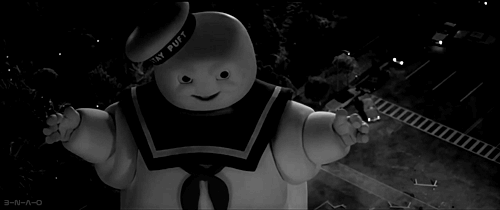
In this movie, he’s not being defeated by high tech, but by the Swiss army knife “every girl should have on her” (because, yes, being a girl is a source of danger just by itself). While the cast of the new movie is literally being smothered by the incarnation of the previous movie, by the “good old times”, the girl who finally came to believe in herself defeats it by "being a girl"
If this not exhilarating metaphor, what is? This is both an homage and refusal to say "original is better because it's the first!" Nope, times change, women are here to claim their places in movies, in the real world, and that new Ghostbusters wasn't gender swapped for nothing, it was because it fits tis day and age, and it was because it fits the theme
Ghostbusters 2016 is grounded in its time, thus being not a useless reboot but a reappropriation of a great idea, playing it across a different era in terms of economy, society, women position...
It's not gratuitous. It's better this way.
Now, I’m aware this piece comes out a bit late to end it on “go see the new Ghostbusters ladies, it rocks and those trolls are just petty men realizing the world is not ENTIRELY them anymore”. So I’m going to end it on “go see Ocean’s 8 ladies, it rocks and those trolls are just...” you get the point. Truth is: Ocean’s 8 is a decent summer movie, functioning, fun, witty and supported by a great cast.

It also acknowledges, in *one line*, why the team is only women, in a very clever, resonant way: it’s smarter to make a heist with women, because women are ignored. That’s it. The movie doesn’t say more, doesn’t need to say more. Because women know that’s true, know they’re not as visible and considered as their male co-workers even when doing an equal or better job. Women will get it just hearing that line. And it’s their freaking movie.
You know what’s the narrative justification for Ocean’s 11 (11!) or original Ghostbusters to be all male?
Well, there isn’t any.
Because that was just default setting.
And boy am I glad to see this changing.
Even if it’s just line by line.
#ghostbusters#jillian holtzmann#erin gilbert#Patty Jenkins#abby yates#paul feig#ivan reitman#sexism#movies#reboot#peter venkman#feminism#oceans 8#writing#script#character driven
42 notes
·
View notes
Text
“Maybe it’s them”
The following note contains heavy spoilers about the plot of the Wonder Woman movie, and some lighter ones regarding Man of Steel and Batman v Superman.

“Wonder Woman was so bad!”
Arguing about movies and ultimately, about writing, is one of my favorite things in life, especially with people who have opposite but educated opinions on the matter. So when two of my favorite friends stated Wonder Woman sucked (while they thought Suicide Squad rocked but I won’t address that part here, this is just a cheap shot on them), I asked and listened.
It turned out the very reasons those two did not find it good were the very reasons I loved it, the very core of what spoke to me when watching that movie. Though I acknowledge it does not feature a perfect script (so few movies do), the directing, acting and above all writing and choice of tone made Wonder Woman, in my opinion, a truly great movie.
So what was it, that thing making it a fantastic experience to me while a letdown for others?
“It’s just… it was so cheesy!”
There you go. The bits that did not quite felt right for them are the same that gave resonance to me, except I’d call it heartfelt. And I found that choice in tonality not only the best one to allow the audience to feel something, but also to be incredibly relevant to that story and that character. There’s absolutely no point in telling Wonder Woman / Diana’s story if you’re not going to engage the viewer on an emotional level and appeal to his ability to be sincere and un-cynical. Because that’s actually what Wonder Woman is about. It’s what the character believes in, it’s what she’s trying to inspire you to.
Thematic resonance is one of the most important part of a story, it’s what makes it sticks afterwards, what makes you think about it after you closed the book or turned off your TV. And yet it’s a writing element that a lot of movies nowadays do not feature. It doesn’t mean it can’t be well directed, entertaining or even contain great pieces of dialogues and structural writing, but it usually means it won’t haunt you, won’t affect you beyond the viewing itself.
In Wonder Woman, that theme exist and everything is built around it: story choices, dialogues, and most of all: the character. Diana is as real and engaging as could be expected. In the end, the movie main quality is one which happens to be look down on nowadays but which, in my humble opinion, can redeem a piece of art of many if not all its sins: Wonder Woman is earnest. The character is written as such. Gal Gadot’s (terrific) acting is done as such, without a hint of sarcasm, Patty Jenkins look on her is totally directed as such. Earnestness. From its best bits to its most obvious weakness, that film screams sincerity, which is why it talks to you beyond its pure script and form. Sincerity is actually the pivot point the character is flesh out around. It’s Diana’s raison d’être, if you will.
From the moment she steps out of Themyscira, Diana is shown to be a very knowledgeable person (she’s read all 12 volumes of Clio’s “Treatises on Bodily Pleasure”, can speak and read many languages…) while being candid if not innocent about the world of men/humans. But even when that aspect is played for a laugh (the revolving door scene), that laugh is never at the expense of the character, and much more of a statement about the way our human world works (compared to the idealistic island of the Amazons). Diana is indeed defined by both a genuine sense of wonder (the ice cream scene) and her ability to feel compassion, by strength and vulnerability, while the movie never assumes the latter to be something Wonder Woman - any woman - should be embarrassed about. In fact Wonder Woman’s script does not fear to feature and show Wonder woman qualities such as empathy or kindness, usually associated to “femininity”, because it totally embraces that feminine aspect as something positive, and not at odds with the idea of strength, determination or courage. It even, once in a while, kindly makes fun of Trevor need to show himself as a masculine figure.
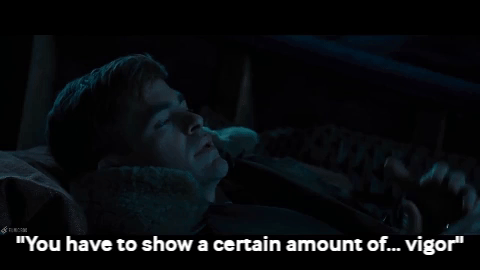
Yet, while embracing that feminine aspect of the character instead of just writing a "strong female character” trope, stripped of any traits usually associated with femininity, the scenario rejects the figure of “The Woman as Men wants to make her” (that great shot of the blue ball gown going off, revealing the armor and Diana ready to fight). Same goes for men: the story does not state they’re inferior (or superior) by design but that they’d be well advise to embrace as well the qualities they probably feature by nature but suppress for being female-perceived. The movie actually manages to say more than it looks like about women’s status and perception in/by the society: the unpractical clothes, designed to make women look nice and prevent them to do anything else, the exchange with Etta Candy about secretary and slavery, the way Diana is dismissed out of the war meeting though she’s the only one able to actually read the Poison journal…
And that’s why the movie is a love letter to womanhood, that’s why Wonder Woman is the hero women deserved: being a strong woman here is not about refusing the “feminine” aspects of one self or acting more like a man, it’s about refusing to be defined by (a world of) men, to whom those traits are usually labelled as weaknesses, as less than. Because it’s not. Empathy is not a flaw, it’s a source of strength and makes you a better person.
Being “feminine” is not a bug: it’s a feature.
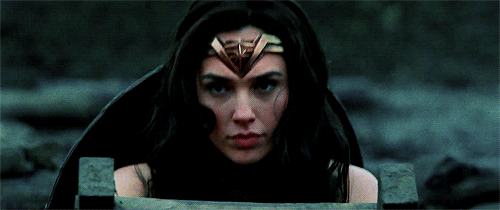
But in the end, my favorite part was how, beyond that declaration of love towards woman kind, that movie turned out to be a statement about mankind as a whole, regardless of gender, nationality... A statement tainted by both cruel discernment on human nature and hope, nevertheless. And again, that statement is effective and functioning in terms of storytelling because it was earned. Because the movie was earnest and because Diana was written as such: a wholesome woman believing in helping people, in kindness. Her good nature as well as her naiveté allow a huge pay off when she’s finally struck by her epiphany. She killed the man that embodies her vision of Arès, of Evil as a person, and the war is not over. Because maybe the war’s inception it’s not the God of War. Maybe it’s them. Men, humans.
I know that last act is somewhat weird (the CGI orgy seems a bit off after such personal staging choices, and it feels like a more intimate ultimate fight would have suit the character better) but maybe it’s just because the culmination point is here, in this last act-break: Diana’s realization that there no Ares (so far), that humans do feature that horror in themselves, despite the ice cream and the kindness and everything, that this world is both beautiful and horrific. And it works because the way this world and the character were presented to us was sincere, because everything that precedes is a build up to allow that emotion.
It’s actually something I find annoying in some Marvel Movies: though the jokes work, it always feel like a way to defuse an emotional bit, like an auto-parody of the material. It’s like the writers don’t fully trust the audience to be engaged and emotionally tested with such strange characters (a teenager bitten by a spider, a man turning into a angry green giant etc.) and thus make it safe, by giving said audience a nod (“we know it’s kind of silly and that self-awareness makes it okay!”). Guess what: I actually enjoy feeling things when I watch a movie, whether about a down to earth character struck by Alzheimer or a semi-goddess able to fly. And a good writer should be able to make me empathize even with the later character. At the very least, a decent writer should not play it safe (which is probably why “Infinity War” turned out to be my favorite Marvel to date). Go for it, take the leap. See what happens.
At the other end of the spectrum, meanwhile, the other DC movies seem to suffer from the opposite disease: a complete lack of humor or fun, a way too grim of a vibe. But the absence of jokes in Man of Steel or Batman v Superman is not the issue itself, merely the symptom of the actual disease: cynicism.
Try and remember: what did Superman make you feel, in its own DC Movies? What did the character inspired you to? See, Zack Snyder obviously wants is super heroes deconstructed and dark and gritty and SO fallible that we are actually never told they were once super heroes. For real. We don’t get to see a non-torturer-tortured-gritty Batman in that universe: for all we know he was always kind of a jerk; we don’t get to see Superman as the “beacon of hope” the world misses so much in Justice League; that’s never earned by the previous scripts. The thing is, if you want to deconstruct a myth, you have to build it in the first place, and the Dc movie universe as a whole skipped that bit, relating on comic books to do the job or just being afraid of doing something “cheesy”. Well, Superman’s “cheesiness” is actually what makes him such an inspiring character, and same goes for Wonder Woman.
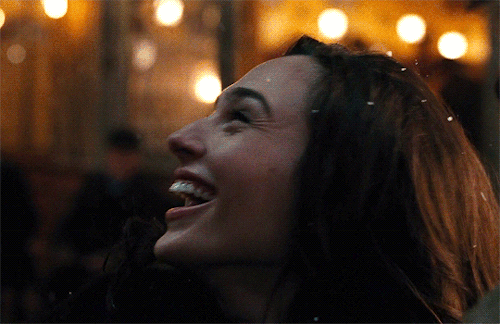
And that’s kind of the main point of Super Heroes as characters and story devices. To inspire viewers like you and I. Real people in the real world are fallible and can often, often let you down - I believe it’s no coincidence that this is the actual movie big reveal, from Diana’s point of view - but fiction characters and most of all, stories, are thing we write and read to go forward as people, as a species. Stories have functions, they have meanings. They have purposes. (Stories of myth failing us too, but again, that should not be chapter one). Patty Jenkins not being afraid of showing it and building that myth is undeniably the best feature of her movie: getting to see Diana construct herself as a faithful, kind hearted, trust giving person toward people makes both her epiphany about man’s dark nature AND her *second* realization a major pay off in terms of meaning and emotion, and in terms of purpose for the movie.
That second epiphany being the whole conceit of the story: that is not the point of Diana’s mission, of her existence to judge whether human people are good or not. In the end, it does not matter, because the whole purpose of her Wonder Woman persona is to inspire people to embrace and demonstrate the good side of humanity. Wonder Woman is a movie about accepting that people aren’t always good and that yet we still have to help. Not because people deserve it, but because we can. It’s a movie about the way we can be the Better Angels of our natures. And it would never have worked if not sincere. If not “cheesy”. If not daring state that we should believe in love.
Because of course, love is the answer. Come on. What's wrong or even cheesy with that? It works. It works because the script was going there from line 1, and more important, it works because in real life, it’s what most of us earnest human beings believe in too. Love is what makes life worth living, a fight worth fighting. Love is the reason most of us are here in the first place, love is the closest thing we’ve got to a meaning of life. So yes, love is solution in a lot of stories. Love is the answer in Frozen because it’s true, love is the answer in Interstellar because it’s true, love is the answer in Wonder Woman because it’s true. For f*ck’s sake, Plato was already stating this 400 years b.c in his Symposium. Love makes perfect sense here, in that story. And if we’re lucky, it makes sense when we turn off the TV and go back to real world.
So in the end, that’s why I think Wonder Woman is a great piece. Because for all its flaws, it purposely make Wonder Woman the actual beacon of hope she’s meant to be, the embodiment of mankind greatest features.
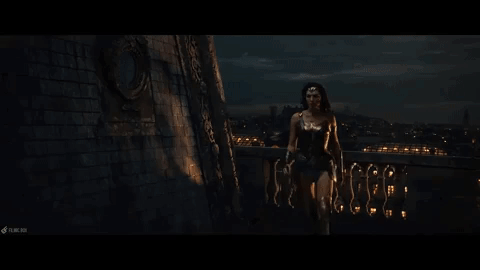
And if indeed it's all about what you believe in, well I believe in fiction, in its ability to inspire us, I believe in super heroes stories being purposeful and in Wonder Woman being a relevant character as of today. And I believe Patty Jenkins proved it in a beautiful way on both level : she obviously believes in Diana as a character, making her stand for true values and belief, and she even more obviously believe in stories as meaningful way to pass on emotions, self-reflection, inspiration. And for that, in our day and age where it looks like cynicism and detachment are way more socially awarded than sincerity and ability to care, I'm grateful to the whole Wonder Woman team that this movie exists just the way it exists. And if you ever are under the impression your earnestness is a weakness, that you don’t seem to fit in a cynical world, well, remember...
Maybe it’s them.
#Wonder Woman#diana prince#patty jenkins#gal gadot#representation matters#feminity#feminism#dccomics#marvel#empathy#writing#screenwriting#superheroes#movies#love#art#art matters#women#womanhood#womankind#comics#inspiration#cynicism#sincerity
8 notes
·
View notes
Text
The most powerfull of all superpowers
(Day 3)


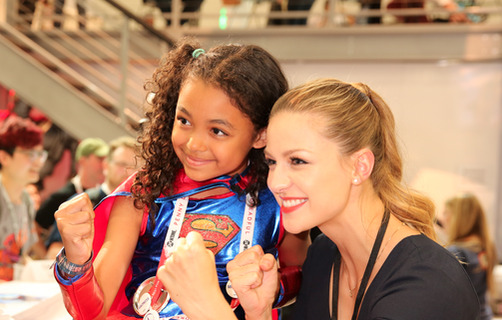

#representation matters#tv show#movie#fiction#girls#wonder woman#supergirl#melissa benoist#ghostbusters#erin gilbert#kristen wiig#star wars#rey#daisy ridley
22K notes
·
View notes
Text
“To understand the miracle of living”
(Day 2)
The following note contains heavy spoilers on the Black Mirror episode “San Junipero” (season 3 episode 4) and some minor ones on other episodes from the show. Please also check tags for content warning.
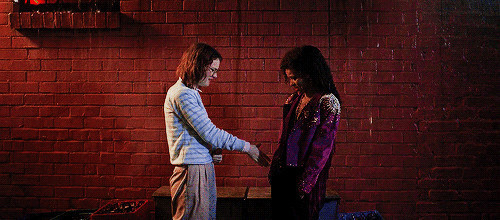
I used to be one of those persons relatively at peace with the very concept of death, yet always struggling with the unfairness of it, the way it strikes indifferently young or old people, comes as the natural ending of a fully-lived life for some, and robs some others of it. I don't believe in afterlife, at least not in an afterlife our beings, minds, souls, if you want to call it that way, could apprehend (thus, survive) anyway. And though the thought of _not existing anymore _would be utterly scary to me, the idea of life having an end wasn't. If anything, it appeared to me as something giving life meaning: if here and now was all that we have, then here and now was incredibly precious. Which is why I'd always fear I wouldn't get enough of it. Fear that I would die before I got to see everything I wanted to see, read everything I wanted to read, met everyone I've wanted to talk to, and wrote every story I had in mind.
Then something happened. The city I was living in went through several attacks. Friends got injured. Friends lost friends. The all city got traumatized. And, I guess, I got traumatized. In the following weeks, the fear of dying or losing people would eat a lot of mind space whenever I would be in the subway, on a café terrace, at the theather... Whenever I would actually be, you know, living on, and in the end, it was smothering me. Till the next attack, on a different city, but where relatives happened to live. For the 3rd time in 15 months I found myself calling people I loved on the phone, to make sure they did not die a horrible, unfair and pointless death. And I believe that's the day something snapped.
From that day I stopped being afraid. I stopped thinking about it. I stopped watching my back on every subway station. Which seemed like a good thing until I realized: I wasn't afraid anymore because I did not care anymore. For nothing. I used to fear death a lot because they were so many things that would make me happy, because I used to enjoyed living, so much, in so many aspects, and so the only way my stupid brain found to stop that fear was to make everything tasteless and pointless and not important anymore. Nothing mattered. Nothing would make me laugh, or cry. I couldn't feel anything anymore. Couldn't be inspired by any words, couldn't find beauty in any landscape, taste in any food, enlightment in any book. At some point, I wouldn't even experience physical pain from injuries, or physical pleasure from the touch of the water. This turned out to be the worst experience of my life. Worse than fighting that physical illness I've been struggling with for 12 years, worse than grieving the death of my favorite human being, and worse than being in fear all the time. I was actually missing it. The constant fear. The pain. The sorrow. Those proofs that not only I was alive, but that I wanted to be, that I wanted to stay longer. I figured out pleasure and pain, joy and fear, were just one big switch. I couldn't turn some off and still have the rest of it. And to my horror, I had no idea of to switch the whole system back on. So I held on as tight as I could to the smallest thing left: that fear of never getting it back. That tiny evidence that some part of me still wanted more life. For a while I would stay away from art, writing, fiction, books, because they were my very favorite things in life and it was devastating to try those on and realize they wouldn't work anymore. I was also scared to waste it on a shut down mind. "Oh, I'll keep that movie for when I'll be better and actually able to enjoy it"
I was all wrong of course. The best way to get better, was to feed that tiny piece of me left with art, writing and books. Which I started to do at some point, asking around for new things to read, watch, experience. I've read brand new authors. Wrote a short novel myself. Got back on drawing and music And I could tell I was slowly getting my senses back, when a friend of mine told me I should try Black Mirror Season 3. Now, if you did watch the 2 first seasons of this british anthology on technology, you know how strange a choice it would be to advise such a dark show on someone trying to find reasons to being alive. But to this day, I suspect that friend actually wanted me to experience "San Junipero", and couldn't spoil the surprise by advising me to skip directly to that very episode....
The contrast effect with the previous episodes probably carries some weight in what makes "San Junipero" such a grand, beautiful piece of writing. If you recall the first episode of Black Mirror, "National Anthem", you know the show is not only about technology itself, but about the way we use it. About, with or without smart electronic devices, we behave. All it would have taken for "National Anthem" to end right was people behaving with basic decency. Same goes for the Waldo Moment. Or "15 millions merits": it's not the technology that guts you in the end, it's the choice the human protagonist makes. All and all, Black Mirror is quite a pessimistic take, not on progress, but on human nature.
But not in "San Junipero". In this one, we finally get to see a future where technology but more importantly, people, are displaying kindness. And it's all the more powerfull when you realize how easy it would have been to write something dark on such a topic.
Indeed, San Junipero, which appears at the beginning to be a "party town", in 1987, is actually a virtual reality where elder people can spend a limited amount of time every week as their younger selves, in order to fight alzheimer's effect or simply enjoy life pleasures in their final days, and where they can be uploaded permanently after they pass. As I said, death occurs in thousands of unfair ways and to me, the only thing that did seemed fair about it was that it's coming for everyone, no matter what you did, no matter who you are. It's quite easy to imagine a future, or at least a Black Mirror episode, where a technology used to cheat death would just be one more, final, unfathomable injustice. Say, only rich people can access it. But it's not the case here. If the time allowed in the system is limited, it's only to prevent people for losing their minds. And staying or not staying is entirely up to you.
Well, almost. The episode follows Yorki on her first night in San Junipero, where she meets Kelly (now there's a lot to discuss about the way Yorki being gay and Kelly being bi is addressed or not addressed, and I think it's done quite beautifully, but that's a topic for another note entirely). Ensue a bound between the two women, who ultimately fall for each other, only, they don't welcome those feelings the same way. While loving Kelly makes Yorki happy, Kelly doesn't want to "do feelings". Doesn't want to like anyone here in San Junipero. "So you've been just totally fucking inconvenient", she says to Yorki when the two are reunited.
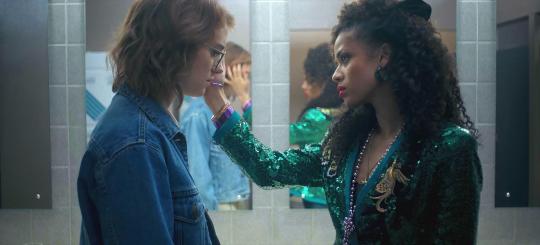
We then find out about San Junipero's true nature, and about Yorki and Kelly's respective situations: they're both old, on the final weeks of their lives but those lives coulnd't have been more different. Yorki suffered a car accident about 40 years ago - the very night she came out as gay to her folks, who rejected her -, and has been quadriplegic since there, missing out on life, while Kelly was married for 50 years, and had a daughter who died in her late 30's, before the technology was even available. Her husband passed away too, a couple years ago, and wouldn't even try on San Junipero, because it could not foresee living on without their daughter.
And Kelly is set on the same choice: she's in San Junipero in her last months because she wants to "have a good time" but does not intend to stay after she dies. Not because she believes she'll actually be reunited with her husband and daughter in heaven - she in fact believes life is all, and that there's nothing past it - but because she gets a sense that living forever is meaningless. That it would take away meaning and taste out ouf everything in life, that she'll end up like most of San Junipero's permanent residents: alone, trying every fucked up thing they could in a desperate attempt to feel something. Because in a way, she gets that she already lived her life, experienced it all and is done.
On the other hand, Yorki can't wait to be a permanent resident, but her family - again - won't let her, so in order to do so, she has to marry Greg, a nurse at her care facility, who will allow her to be euthanized then uploaded into the system. When Kelly finds out about Yorki's situation, she offers to be the one marrying her. "Greg seems great but... why not someone you connected with?". (At this point I was already smiling ear to ear - and, ok, crying just a tad). Yorki thus becomes a permanent resident and finally gets to enjoy walking, moving, feeling. And being loved, something we know she was deprived of basically her whole life. So it makes sense for her to want to share it with Kelly, to have Kelly staying with her. "This is so real", she says to her. "This is not a trap". But Kelly then tells her about her own life story ("did it occur to you to ask?"), about her late husband and daughter, and states again that she made her choice not to stay in San Junipero.
So while I was actually understanding both their point of view, and especially Kelly's, I was fearing the episode ending on Yorki's finally getting her chance to live... in a solitary, meaningless place. Trapped. Because that's what that show is about: how technology and our way to use it is a trap. And that's what the episode was about, wasn't it? Stating that living forever is pointless without a reason, a person to share it with and that accepting death itself should not be that depressing. Yorki and Kelly's fight about it ends with Kelly running away in her car, and crashing, just as Yorki did 40 years ago following her fight with her folks, about being gay. And at the very moment Yorki reaches for Kelly's hand to help her back on her feet, Kelly's time in San Junipero is up, and she's sucked out of the system, back to her dying body, while Yorki remains alone.
But then comes the final twist. The one that you usually fear for Black Mirror has the ability to leave you listless on the floor. The one, that, here, in an consistent, organic way with the rest of the narrative, actually brings tears of joy to your eyes. Yorki's line earlier turns out to be true: it's not a trap.”
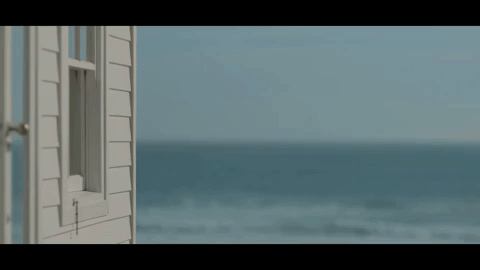
So Kelly passes over, and actually chose to stay in San Junipero. For a second there, through the overwhelming wave of mere happiness I was experiencing, the tiniest part of me got upset. Because the former me, the "before PTSD and emotional shutdown me" was actually agreing with Kelly, on forever being pointless, on having lived your life and accepting there's an end to it and it felt like a let down to have a character not believing in afterlife but still finding meaning in death, going the other way in the end. This feeling lasted a second or so, before I realized something in Kelly's very last words and on the last shot of the episode itself.
Kelly did not change her mind about the meaning or aftermath of death, let alone about the lack of meaning in "forever". She doesn't say "ok let's go on living forever" but that, “all things considered” she’s ready for the rest of it. I guess that by mimicking Yorki's car accident, which left her trapped in a organic, natural and, yes, 'real' body but deprived her of any physical experience, Kelly put herself in her lover's shoes, became aware that the full life she lived, the joy, the pain, the all experience of it, was denied to Yorki, and that San Junipero is her chance to finally get that. To live. But as her last line states, Kelly's final choice to stay in San Junipero isn't made out of pity, but out of that second and more personal / self-centered realization that there's a "rest of it" for her too. Some things left to experience, some happiness left to live. She makes that choice out of realization she does have, in her love for Yorki, a reason to stay on a big longer.
I don"t think that "For the rest of it" happens to be San Junipero's last spoken line by chance. For me, it's one final description of what the system has to offer. Just like the very last image happens to be the computing servers hosting the population's spirits, consciousness, souls, if you'll have it.
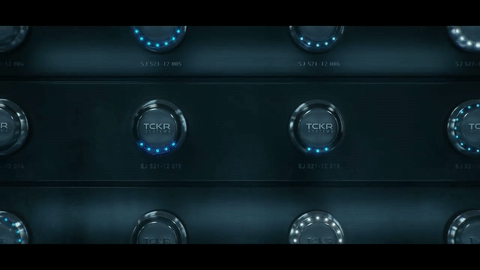
Kelly and Yorki's souls still exist on a physical, thus perishable, mortal medium. At some point, that server will crash, or run out of power. Something will end it. Just as an organic body, it is ephemeral and won't last forever. Because San Junipero, the system, and, I think the story, isn't about forever. It's about love, connecting with people, and other reasons making worthwile to hang around a bit longer.
It's about "the rest of it".
It's about more life.
And as of today, yes.
I do know what that's worth.
youtube
5 notes
·
View notes
Photo

(Day 1)
The way I see it, anything, everything that happens to you, bad stuffs included, can be fuel for art & fiction. And then, over time, art & fiction turn into fuel for good things to happen.
5 notes
·
View notes